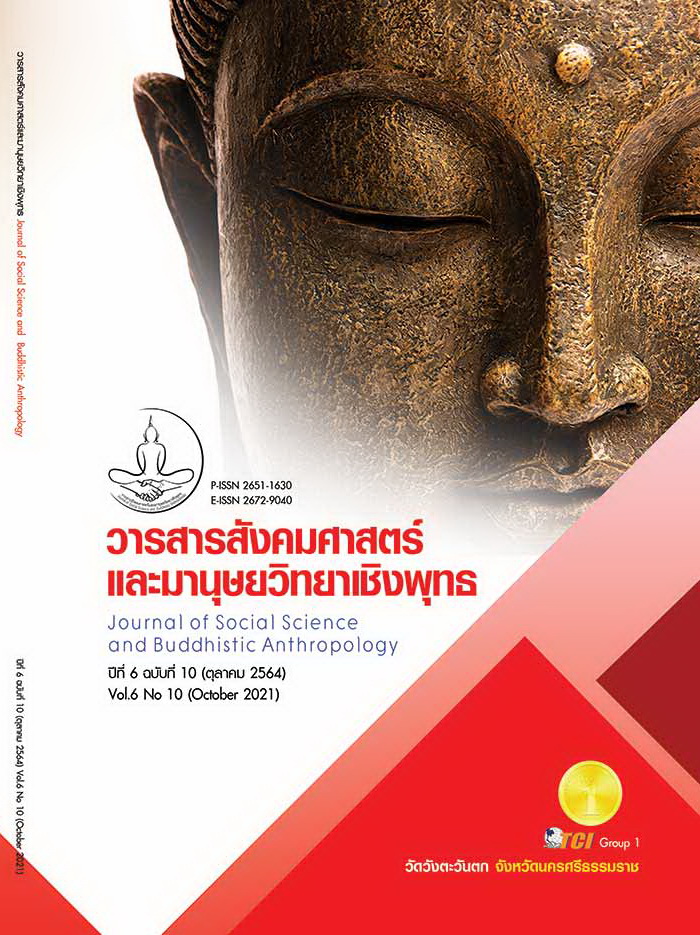A STUDY OF ROLES OF CIVIL SOCIETY, PRIVATE SECTOR AND PUBLIC SECTOR FOR ORGANIC AGRICULTURAL POLICY IMPLEMENTATION: A CASE STUDY OF ORGANIC RICE IN THAILAND’S LOWER NORTHEASTERN REGION
Keywords:
Organic Rice Cultivation, Public Policy, Policy ImplementationAbstract
The objectives of this research article were to 1) studying the development of organic rice cultivation promotion and the roles related sectors in implementing organic rice cultivation promotional policies in Lower Northeastern provinces; and 2) studying the models for implementing policies to promote organic rice cultivation in three provinces. The study involved qualitative research based on interviewing the representatives of civil society organizations who producing organic rice continuously, the representatives of private sectors who are buyers and exporters of organic rice, and the representatives of public sectors related to organic rice promoting. In addition, observation and relevant documents were also applied. The research utilized the interpretation of the data acquiring from interviews and documents, and validated data by applying the triangulation method. The findings indicate that 1) in the earlier organic rice and agriculture was leaded by the civil society and private sectors, then it was supported by the provincial policies of some governors. The national organic agricultural development strategies were formulated later. 2) The roles of civil society and the private and public sectors play a great role in promoting completely organic rice, although the public sector switched to the promotion of organic agriculture later on. However, civil society and the private sector still have more expertise than the public sector in using their experience in marketing to lead production, marketing channels, complete knowledge of organic agriculture, shortages of workforce, as well as collaboration between NGOs and the public sector. The findings also indicate that the continuity of provincial organic rice promotion, provincial policy implementation structure, marketing strength and the ability of farmers all affect the sustainability of organic rice cultivation and the expansion of organic rice cultivation area.
References
กัญญา อ่อนศรี. (22 พฤษภาคม 2563). การขับเคลื่อนการปลูกข้าวอินทรีย์ในจังหวัดสุรินทร์. (เพียงกมล มานะรัตน์, ผู้สัมภาษณ์)
เกษมศักดิ์ แสนโภชน์. (30 พฤษภาคม 2563). การขับเคลื่อนการปลูกข้าวอินทรีย์ในจังหวัดสุรินทร์. (เพียงกมล มานะรัตน์, ผู้สัมภาษณ์)
คนึงนุช กุลวงศ์. (26 พฤษภาคม 2563). การขับเคลื่อนการปลูกข้าวอินทรีย์ในจังหวัดอุบลราชธานีในมุมมองของภาคเอกชน. (เพียงกมล มานะรัตน์, ผู้สัมภาษณ์)
ฐิติวิชญ์ เศรษฐพัฒนชัย. (26 สิงหาคม 2563). บทบาทของภาคเอกชนในการส่งเสริมนโยบายข้าวอินทรีย์ของจังหวัดสุรินทร์. (เพียงกมล มานะรัตน์, ผู้สัมภาษณ์)
นพดล ผุดผ่อง และคณะ. (23 พฤศจิกายน 2561). การขับเคลื่อนการปลูกข้าวอินทรีย์ในจังหวัดยโสธร (สนทนากลุ่มย่อย). (เพียงกมล มานะรัตน์, ผู้สัมภาษณ์)
บุญเรือง พุทธบุตร. (14 กุมภาพันธ์ 2563). การขับเคลื่อนการปลูกข้าวอินทรีย์ในจังหวัดยโสธร. (เพียงกมล มานะรัตน์, ผู้สัมภาษณ์)
บุญส่ง มาตขาว. (19 ธันวาคม 2562). การขับเคลื่อนการปลูกข้าวอินทรีย์ในจังหวัดยโสธร. (เพียงกมล มานะรัตน์, ผู้สัมภาษณ์)
พรรณี เสมอภาค. (1 มีนาคม 2563). การขับเคลื่อนการปลูกข้าวอินทรีย์ในจังหวัดอุบลราชธานีในมุมมองของภาคเอกชน. (เพียงกมล มานะรัตน์, ผู้สัมภาษณ์)
พาทิน จันทสิงห์. (24 มกราคม 2563). การขับเคลื่อนการปลูกข้าวอินทรีย์ในจังหวัดยโสธรในมุมมองของภาคเอกชน. (เพียงกมล มานะรัตน์, ผู้สัมภาษณ์)
ไพศาล แจ่มจำรัส. (3 ธันวาคม 2562). บทบาทของภาคเอกชนในการส่งเสริมนโยบายข้าวอินทรีย์ของจังหวัดยโสธร. (เพียงกมล มานะรัตน์, ผู้สัมภาษณ์)
วิฑูรย์ ปัญญากุล. (17 กุมภาพันธ์ 2563). การขับเคลื่อนการปลูกข้าวอินทรีย์ของประเทศไทย. (เพียงกมล มานะรัตน์, ผู้สัมภาษณ์)
ศิริพร สมยา. (19 มิถุนายน 2563). การขับเคลื่อนการปลูกข้าวอินทรีย์ในจังหวัดอุบลราชธานี. (เพียงกมล มานะรัตน์, ผู้สัมภาษณ์)
อังคณา บุญสาม. (29 พฤษภาคม 2562). การขับเคลื่อนการปลูกข้าวอินทรีย์ในจังหวัดยโสธรในมุมมองของภาครัฐ. (เพียงกมล มานะรัตน์, ผู้สัมภาษณ์)
อุบล อยู่หว้า. (20 พฤษภาคม 2562). การขับเคลื่อนการปลูกข้าวอินทรีย์ของประเทศไทย. (เพียงกมล มานะรัตน์, ผู้สัมภาษณ์)
Donaldson, J. A. & Moore, J. D. (2017). Going green in Thailand: Upgrading in global organic value chains. Retrieved April 5 , 2021, from https://ink.library.smu.edu.sg/soss_research/3042/, viewed on
Food and Agriculture Organization of the United Nation (FAO). (2014). FAO Statistical Year Book 2014. Regional Office for Asia and Pasific. Bangkok: Food and Agriculture Organization of the United Nations.
Gormley W. T. & Balla S. J. (2013). Bureaucracy and Democracy: Accountability and Performance (3rd edn). Thousand Oaks: CA: SAGE.
Hérique, O. & Faysse, N. (2020). A large-scale public programme to promote organic rice farming in Thailand: building solid foundations to enable farmers to engage? Org. Agr, 11(June)27-40.
Hjern, B. & Porter, D. O. (1981). Implementation Structures: A New Unit of Administrative Analysis. Organization Studies, 2(3): 211-227.
Makita, R. & Tadasu, T. (2017). Fair Trade and Organic Initiatives in Asian Agriculture: The Hidden Realities. New York: Routledge.
Udomkit, N. (2002). Conventional Trade Versus Fair Trade: The case of Organic Rice. In Conference Paper presented at The 8th International Conference of Thai Studies Rural Development on The Blurring of the Rural-Urban FrontierNakhon Phanom, Thailand. Ramkhamhaeng University.









